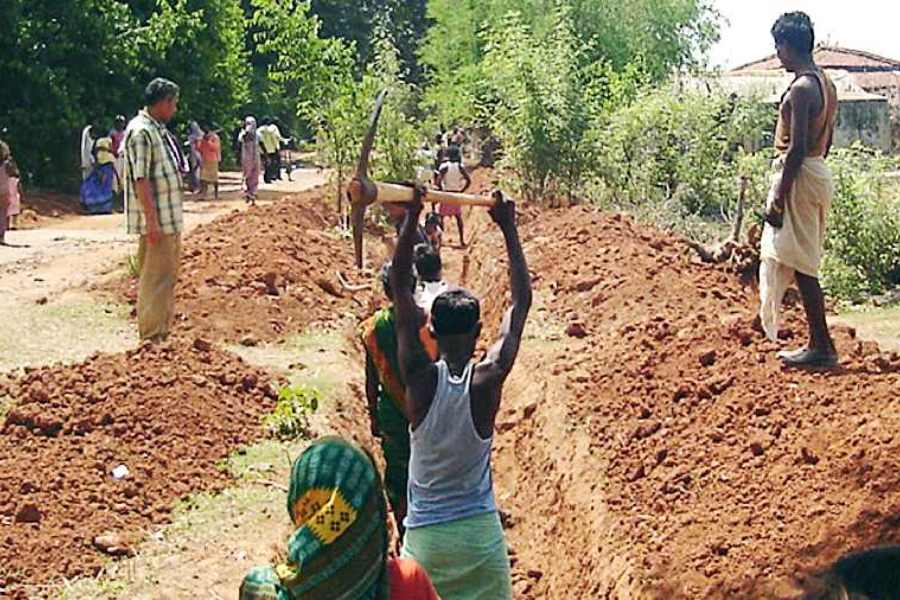A research organisation that conducted a field verification of the record deletion of job cards from the rural employment scheme’s database in 2022-23 has suggested violation of due procedure and wrongful deletion.
Various state governments deleted over 5 crore job cards from the Mahatma Gandhi National Rural Employment Guarantee Act (MGNREGA) database last financial year — far higher than the yearly average of 1 crore to 1.5 crore deletions.
The governments claimed this was routine updation, citing reasons such as duplicate or fake cards, deaths, and cardholders’ unwillingness to work under the scheme any more.
LibTech India conducted the field verification by interviewing, between October 2022 and June 2023, a total of 600 workers in Andhra Pradesh, Gujarat, Telangana, Odisha and Jharkhand whose cards had been deleted. It found that rules were flouted in all 600 deletions and that the reasons cited were incorrect in 380 instances.
Laavanya Tamang, a LibTech India researcher, cited the huge jump in deletions in 2022-23 to suggest a deliberate paring of numbers by state governments, which faced pressure from the Centre to ensure that MGNREGA wage payments were made through the cumbersome Aadhaar Based Payment System (ABPS). She said ensuring ABPS compliance would have meant a lot of work for the states.
“It seems the states accelerated the deletion of job cards as the Union rural development ministry insisted on 100 per cent ABPS compliance,” Tamang said.
In a written reply in the Lok Sabha on July 25, 2023, rural development minister Giriraj Singh had said the total deletion of MGNREGA job cards stood at 5.18 crore in 2022-23 against 1.5 crore in 2021-22. In 2022-23, Bengal topped the list with the deletion of 83 lakh job cards.
“The various reasons for the deletion of job cards are given below: i. fake job card (incorrect job card) ii. duplicate job card iii. now, not willing to work iv. family shifted from Gram Panchayat permanently v. single person in job card and the person is expired,” Singh said in the reply.
The annual master circulars (AMCs) issued under the MGNREGA allow job card cancellations on 13 specific grounds. However, any addition or deletion of job cards must be presented before the gram sabha concerned.
Tamang said the field verification exercise had found that the gram sabhas were not consulted in any of the 600 deletions.
The AMCs say that job cards can be cancelled on the grounds of non-demand only if the holder applies for deletion, or the panchayat-level MGNREGA official can do so after informing the gram sabha.
“They (states) mentioned reasons like not willing to work or not present in the panchayat in most of the cases. After verification, we found the reasons cited in the official documents were not true in the case of 380 of the 600 workers interviewed,” Tamang said.
She said that throughout 2022, the Union rural development ministry had nudged the states to shift to the ABPS for wage payments under the scheme, before issuing letters on January 30, 2023, mandating 100 per cent compliance from February 1. (The deadline was later shifted several times.)
For ABPS compliance, the worker’s Aadhaar number must be seeded with his or her job card — a task to be facilitated by the state government — and bank account, and must be linked to the bank’s Institutional Identification Number in a database created by the National Payment Corporation of India.
To avoid such a cumbersome process, the states possibly found deletion the easiest option, Tamang said.
Going by the findings of the field verification, it can be assumed that a significant number of people have become victims of wrongful deletion, Tamang said.
An email was sent to rural development secretary Shailesh Kumar Singh on October 5 asking whether the charges of wrongful deletion were true and, if so, what the Centre had done about it. His response is awaited.
As of August 15 this year, 57 per cent of MGNREGA workers were still to be ABPS compliant. Protests from civil society groups have forced the government to extend the deadline to December 31.
There are now nearly 26 crore registered MGNREGA workers in the country, under more than 14 crore job cards (multiple members of a single household can share a single card). The scheme provides for up to 100 days’ work a year to every rural family.
According to the MGNREGA website, the government has already — just over six months into the financial year — released 98 per cent of the Rs 60,000 crore allocated in the budget for the scheme.










